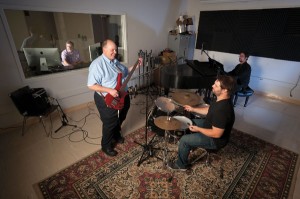The student has become the teacher. At least three days a week, that is.
Junior Nahoma Presberg takes five classes, works as the publicity manager for LOGOS, UR’s art and literature journal, volunteers at School 33 once a week as a member of Partners in Reading, and frequents ASL Club’s silent coffees. What you might not expect to discover, however, is that she’s also a religious school teacher at Temple B’rith Kodesh, a reform synagogue on Elmwood Avenue.
It is not uncommon to find UR students working on campus in labs, dining facilities, department offices, and countless other positions, but the world doesn’t end beyond University property. So what propels students to seek indefinite employment off-campus as opposed to an internship, which is typically held only for a certain period of time?
Presberg can be found teaching three days a week: Sundays she co-teaches first graders, Tuesdays she assists in a third-grade class, tutoring students who are either ahead or behind the prescribed curriculum, and Wednesdays she works with fifth graders, supporting them in a more independent study. Each class has between 12 and 22 children. But it doesn’t stop there — she also advises a Jewish fourth through sixth-grade youth program, which does programs once a month.
And in case you were wondering, yes, she does get paid.
“I think it’s a great experience,” Presberg said. “It feels more like the real world.”
After working at the temple as a substitute teacher since April 2012, she became a permanent member of the staff in September. However, Presberg is no stranger to the field. She worked as an assistant teacher at the Irondequoit Hebrew Studies Center for four years, two of which were paid, starting her freshman year of high school. She describes her current position as a continuation of this post, but with additional responsibilities.
But for Presberg, this is both a job and practical experience that relates directly back to her plans for the future. At the moment, she hopes to work in mental health counseling, a field she believes has much in common with education.
“If I didn’t have this job, I wouldn’t be working, probably,” she said. “The purpose wasn’t to get a job — the purpose was to work there.”
There are two main reasons students might look for a job off campus, according to Career Center Director Burt Nadler — to earn money, clearly, but also to gain additional experience for a future career if a position off campus is more directly related to a student’s interests than a job at UR.
“I’m very narrow-minded in a positive way,” Nadler said, explaining that nearly any position is worth the extra time if it is career-related and makes a positive contribution to a student’s educational experience.
Nadler noted that he wouldn’t necessarily advise students one way or another to get an off campus job but recommends they seek one later in their academic career if possible so they can first acquire their “academic sea legs.”
Eastman School of Music senior Carrie Davids doesn’t seem to mind working the job for the job, however. For her, the Victoire Belgian Beer Bar & Bistro on East Avenue where she works as a hostess and server, is much more than just a dining establishment.
“I feel like it’s kind of my family away from home,” she said, explaining how she will often spend time with her coworkers after shifts and that they are all there to support each other, on and off the job.
Davids had an on-campus job working in Eastman’s Concert Office her freshman and sophomore year but had trouble finding another job on campus when she looked for a position where she could earn more. She began working at Tavern 58 on University Avenue in September 2011 as a junior and moved to Victoire in October 2012. As a second-semester senior, Davids is only taking 12 credits and fills her classless Tuesdays and Thursdays with work.
Even though her work at Victoire may not directly relate to her plans for the future, Davids has discovered that her position can offer opportunities for networking, especially when she interacts with regular customers. On a basic level, Davids simply enjoy interacting with her customers. Plus, she noted, it’s just nice to get out of the Eastman bubble once in a while.
Nadler was quick to acknowledge that one of students’ most precious commodities is time, an important factor when deciding whether or not to seek off-campus employment. It is often logistically difficult to travel to an off-campus job, especially without a car, not to mention balancing a myriad of other responsibilities.
Sophomore Kedar Shashidhar experienced this strain firsthand.
Shashidhar worked at Blackdog Recording Studios on East Avenue as an intern this past summer to gain practical experience in the field. Once the school year started, he stayed on to manage the company’s website and help run the studio when his boss couldn’t be there. He recently quit because the position was too much of a time constraint and because of what he describes as unrealistic expectations from his boss.
In exchange for his work, Shashidhar agreed to accept one-on-one lessons in how to run the studio in place of a paycheck, but his relationship with the company became increasingly strained as he put his “heart and soul” into a job, that didn’t give back.
“It was like a romance gone wrong,” Shashidhar said.
Shashidhar would wake up at 7 a.m. every Tuesday and Thursday and get picked up by his boss at 7:30 a.m., who would give him a ride to the studio, only to get dropped off on campus again at 10 a.m. in time for his first class. He would have to go in by bus when running recording sessions at sporadic times throughout the day though. These sessions could go past 2 a.m., which would leave Shashidhar to stay downtown with friends at Eastman and take the bus back to campus the next morning.
Presberg shared in having a packed schedule.
“Yes, I do wish I had more time, that’s the answer to that question,” she said, “but I don’t really feel like any of the things that I’m doing is stuff that I don’t really want to do.”
For Shashidhar, it was all about the practical benefits.
“I definitely wouldn’t have taken [the job] if it wasn’t related to my career,” he said.
The job wasn’t without its upsides, though. Shashidhar met many relevant contacts in the industry, including big-name musicians such as Flo Rida and Gym Class Heroes, and got a practical education about how the music business works in a small town like Rochester.
“I really loved the real-world experience,” he said.
Off-campus employment isn’t for everyone — Presberg believes it really does depend on the person and what they’re looking for.
“If you’re looking for a job just to make some money, I wouldn’t necessarily say it’s best to go off campus,” she said, citing the fact that there are simply more logistical issues to consider and that not everyone’s schedule can accommodate such a position.
Sometimes though, it’s just the right fit.
“I like being off campus,” Presberg said. “It makes me feel like a real person.”
Goldin is a member of
the class of 2013.






